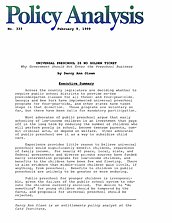Across the country legislators are deciding whether to require public school districts to provide no-fee prekindergarten classes for all three- and four-year-olds. Georgia and New York have implemented universal preschool programs for four-year-olds, and other states have taken steps in that direction. Those programs are voluntary so far, but there have been calls for mandatory participation.
Most advocates of public preschool argue that early schooling of low-income children is an investment that pays off in the long term by reducing the number of children who will perform poorly in school, become teenage parents, commit criminal acts, or depend on welfare. Other advocates of public preschool see it as a way to subsidize child care.
Experience provides little reason to believe universal preschool would significantly benefit children, regardless of family income. For nearly 40 years, local, state, and federal governments and diverse private sources have funded early intervention programs for low-income children, and benefits to the children have been few and fleeting. There is also evidence that middle-class children gain little, if anything, from preschool. Benefits to children in public preschools are unlikely to be greater or more enduring.
Public preschool for younger children is irresponsible, given the failure of the public school system to educate the children currently enrolled. The desire to “do something” for young children should be tempered by the facts, and proposals for universal preschool should be rejected.

This work is licensed under a Creative Commons Attribution-NonCommercial-ShareAlike 4.0 International License.

